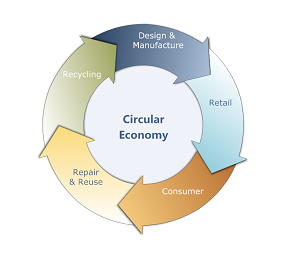Vision
Our vision is for a sustainable society: A society where waste materials are not discarded, but are transformed into reuseable products or energy. Waste from one process becomes the resource for another process. This is called a 'closed loop' or 'circular economy'.
WRAP (a charity created to accelerate the move to a sustainable resource-efficient economy) describes the circular economy as
"...an alternative to a traditional linear economy (make, use, dispose) in which we keep resources in use for as long as possible, extract the maximum value from them whilst in use, then recover and regenerate products and materials at the end of each service life."

As society moves towards a circular economy, there will be significant environmental and social benefits:
Less pollution from waste entering the land, air and sea, meaning reduced adverse effects on people's health and the environment
Less mining, quarrying and drilling for raw materials, requiring less energy and less land.
Removing the risk of 'running out of resources', leading to a more sustainable economy, with security of supply of materials and energy.
Recovering energy and valuable resources from waste materials is an attractive but challenging prospect. The valuable materials are usually present in wastes in very low levels and present as a highly complex mixture. This makes it difficult to purify them in an economically sustainable manner, and is one of the major challenges in achieving a circular economy.
Recovering resources from wastewater
In the UK over 11 billion litres of wastewater from domestic, municipal, commercial and industrial sources and rainwater run-off are collected by sewers every day. Wastewater often contains a mixture of many different kinds of materials, often at low levels.
Our vision is that Microbial Electrochemical Technology, which harnesses the amazing capabilities of microorganisms, will be used to treat a range of wastewaters containing a mixture of pollutants, to extract the energy and useful resources they contain.
Our project brings together experts from academia and industry to translate our laboratory research on microbial electrochemical systems to real-world sustainable processes for water treatment and resource recovery.
To find out more, see our Science page.
